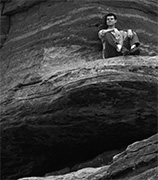Web 2.0 Culture and the Curse of the Turing Machine
Back at the beginning of 1995 I created a website named "Romantic Gestures". The purpose was to draw people into a virtual community who wanted to share experiences and ideas with others about all things romantic. In that time I noticed that people are more open about giving personal details on the internet than they were in real life.
People who were only five years old around that time are now 18, and the internet isn't the primarily-academic-coddle-baby it was back then. It stemmed beyond being a tool into being a full-blown culture. The Web 2.0 craze that took off about four years ago and introduced a level of creativity, open structure and more importantly, virtualized community-style culture. It's this culture that changed the upcoming generation into something almost unnatural. People began to do everything online. It lacked physical, personal interaction.
Babies require a good deal of coddling. That touch builds a naturally emotional bond to others and forms as a sort of grafting into the world. Without touch, a baby's will to live wanes and (s)he becomes failure to thrive.
Although online communities and groups are amazing and wonderful, I think they've become the backwash of their physical counterparts. People need physical interaction as much as the emotional and intellectual stimulus provided by the internet's vast array of discussion groups and communities.
The future is in merging the two. Use Flickr to identify people in your area to meet with. Use Blogger to locate others nearby that you can karaoke with. There's already a somewhat successful meetup.com model that allows people to interact with one another - but their interface and navigation feels stale and cumbersome.
At least the frequent emails from meetup keep me abreast that there is a world out there where people meet - they have faces and feelings and can do amazing things without the internet. There is a sort of sick comfort in doing things alone, though. It's selfish in a way. But having a spouse and children provides a life-giving feedback that my life is bigger than me and even bigger than the internet.
People who were only five years old around that time are now 18, and the internet isn't the primarily-academic-coddle-baby it was back then. It stemmed beyond being a tool into being a full-blown culture. The Web 2.0 craze that took off about four years ago and introduced a level of creativity, open structure and more importantly, virtualized community-style culture. It's this culture that changed the upcoming generation into something almost unnatural. People began to do everything online. It lacked physical, personal interaction.
Babies require a good deal of coddling. That touch builds a naturally emotional bond to others and forms as a sort of grafting into the world. Without touch, a baby's will to live wanes and (s)he becomes failure to thrive.
Although online communities and groups are amazing and wonderful, I think they've become the backwash of their physical counterparts. People need physical interaction as much as the emotional and intellectual stimulus provided by the internet's vast array of discussion groups and communities.
The future is in merging the two. Use Flickr to identify people in your area to meet with. Use Blogger to locate others nearby that you can karaoke with. There's already a somewhat successful meetup.com model that allows people to interact with one another - but their interface and navigation feels stale and cumbersome.
At least the frequent emails from meetup keep me abreast that there is a world out there where people meet - they have faces and feelings and can do amazing things without the internet. There is a sort of sick comfort in doing things alone, though. It's selfish in a way. But having a spouse and children provides a life-giving feedback that my life is bigger than me and even bigger than the internet.
Labels: community, culture, internet, machines, people, touches, web 2.0








